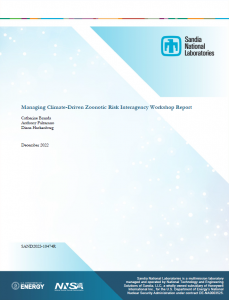Climate change will only continue to influence the geographical distribution and proliferation rates of zoonotic disease vectors. Increasing global temperatures, changes in precipitation and wind patterns, shifting population centers, as well as regional conflicts over diminishing natural resources, are all factors associated with climate change that can directly impact disease-vector prevalence, increasing risk to human, animal, and agricultural health.
In response to these threats, Sandia National Laboratories hosted the invitation-only “Managing Climate-Driven Zoonotic Risk: An Interagency Workshop” at the National Press Club in Washington, DC, July 20–21, 2022. This workshop brought together representatives from CDC, BARDA, NIAID, DHS, DOS, DTRA, EPA, NASA, NOAA, USGS, USDA, FDA, and the DOE National Labs to address the increasing risks of zoonotic disease associated with climate change and to discuss and propose strategies for managing these risks.

Dates: July 20–21, 2022
Location: National Press Club, Washington, DC
Objectives for this workshop included 1) shared agency briefs on areas of responsibility and concern at the intersection of climate and zoonotic disease (see attached draft agenda), 2) identification of what data could improve predictive models of disease emergence, and 3) identification of critical research questions and surveillance strategies to prevent human and livestock disease outbreaks. Outputs of the workshop are to include 1) an OUO workshop report including contact information, 2) a graphical representation of high-level workshop conclusions, and 3) identification of topics for subsequent deep-dive workshops to include government, academia, and industry.
View the agenda.